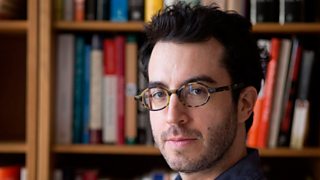Jim Naughtie on meeting Jonathan Safran Foer
We spent a good deal of time this at month’s Bookclub recording talking about the "muchness" of the personality and imagination of a nine-year-old boy. "Muchness" is Jonathan Safran Foer’s word for the extent of young Oskar’s sensibility – tested and extended by his search after the Twin Towers attacks of 9/11 for the truth about his father, who was killed on that day.

The novel is Extremely Loud and Incredibly Close, written by Jonathan four years after the attacks when he was still in this mid-twenties. It’s a quest that begins with Oskar’s discovery of a key and an envelope with the word "Black" on it, in his father’s handwriting. So he does what any young boy would do, and scours the New York telephone book for everyone called Black. They’re everywhere, one of them even working as an attendant at the top of the Empire State Building.
The story that flows from his discovery is one about his own mind. In his discussion with this month’s readers, Jonathan surprised no-one when he revealed that he read philosophy as a student: his approach to story-telling, and his handling of character, involves solving all kinds of puzzles. Why did he think that? Was there a different way of thinking about what his father might have kept hidden? So Oskar’s adventure is the story of a young mind coming to grips with a world turned upside down. As Jonathan put it in answer to one of the questions, his mother, whom he can see, seems more absent to Oskar than his father, who is dead.
And as he told us, Oskar’s liability as a person – simply because of his age – becomes an asset to the novelist. He is less restrained and repressed than a grown-up would probably be, and doesn’t have much a concept of what it is appropriate or inappropriate to say or do. Consequently, the novelist has a more exciting playground to exploit. Oskar is bound to change in the course of the story, because that’s what young boys do, especially when they’ve experienced an event like the death of a father – in circumstances that are almost too awful to imagine, complete with a last message left on the home answering machine when he probably knew there was no chance of survival in the World Trade Center. For example, Oskar treasures objects that are tangible reminders of his father – and Jonathan revealed that he hoards gifts from people (and gives them) as physical connections with friends and acquaintances. Brushes from a painter friend, spectacles belonging to the writer Joan Didion, a photograph of one of his first memories, lying on his father’s chest. They’re the lasting shards of memory.
There are many 9/11 novels, but this has been one of the most successful, I suspect that, apart from Jonathan’s gifts as a writer which have brought him celebrity, the innocence of Oskar was always going to be alluring.

"One of the interesting things about Oskar is that we’re not exactly aware of what he knows and doesn’t know, what he’s aware of and isn’t, and clearly he gets educated in the course of the book." So, of course, does the reader. Jonathan is one of America’s rising literary stars, an eloquent, funny, provocative thinker who can tell a story that steers away from the obvious and the expected, to cast light on his characters form unusual angles. I do hope you enjoy Extremely Loud and Incredibly Close and listening to him on this month’s Bookclub.
Happy reading
Jim
Jonathan Safran Foer (right) discusses the real life explosion that inspired the novel.




